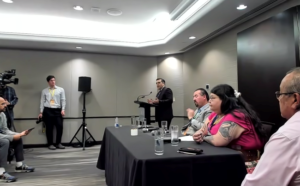Chiefs of Ontario hosts First Nations Community Wellness Conference

By Rick Garrick
TORONTO — Ontario Regional Chief Glen Hare discussed the sudden loss of former National Hockey League player and Michipicoten citizen Chris Simon to poignantly open up the March 19 media event at the Chiefs of Ontario’s First Nations Community Wellness Conference.
“That was hard to take — here’s a man who represented First Nations, he was the enforcer in the NHL,” Ontario Regional Chief Hare says. “When they got rid of him, I visited his family lots in Wawa on my travels. They dropped him so hard, the NHL, that [his)] grandma never watched hockey again in her house. Here’s an example of where was the support for a man who we idolized around the world, who captured many audiences? He was our enforcer.”
The conference, which focused on the goal of improving community wellness, was held from March 19-21 with about 900 participants at the North Building, Toronto Metro Convention Centre in Toronto.
“Today, we gather to discuss the pressing issue of First Nations health and wellness, the dire need for a holistic approach to addressing the challenges we face as nations,” Ontario Regional Chief Hare says. “First Nations wellness cannot be addressed in isolation, we must understand that the challenges we face are complex and interrelated. I know we as First Nations are fighting these challenges by ourselves. I see government approaching other governments for funding, for big monies, we get very little of that.”
Ontario Regional Chief Hare encourages companies with plans to do business in First Nations territory to talk to the rights holders.
“Talk to the Chiefs, they’re the ones that should let you in and sign agreements with you,” Ontario Regional Chief Hare says. “Share the wealth, the social determinants of health are vital components that significantly influence the well-being of our nations.”
Anishinabek Nation Grand Council Chief Reg Niganobe says the large amount of participants at the conference reflects the reason they were meeting, “the advocacy for our health.”
“They used to do a health forum but they switched it up a little bit this year,” Grand Council Chief Niganobe says. “It’s not just limited to health, there’s so many other factors that play into that and impact us in different ways, whether it be the colonization of our communities and our practices and our leadership and how we kind of take care of ourselves. Traditionally, we have ways that take care of ourselves in terms of making selections for our communities and making decisions for our communities and our decision-making, that’s made up of a collective of the community, that’s made up of different sectors of our community, people who may be experts in health, people who may be experts in social, and may be experts in education, and may be experts in engineering.”
Grand Council Chief Niganobe says First Nations moved away from that due to colonization.
“Now, as ORC [Hare] was alluding to, we have people who tell us what’s best for us and that’s not always the case,” Grand Council Chief Niganobe says. “It is definitely not always the case that they know exactly what’s best for us. During the (COVID-19) pandemic, that was highlighted — they said, ‘Close down your First Nations.’ Yes, that was a good idea, but I know why, too, because we don’t have the resources to help prevent those diseases to help our communities stay safe.”
Grand Council Chief Niganobe says there are several co-morbidity factors within First Nations, such as diabetes, heart conditions, and heart disease.
“It’s an [overarching] issue, food-wise,” Grand Council Chief Niganobe says. “If you were even to just panel these youth here, probably, you could ask how many of them have actual grocery stores within their communities where they can have access to fruits, vegetables, good foods that are inexpensive. We know that for the Canadian public, food costs are rising, so that’s exasperated in our communities, it’s doubled in our communities to get access to good foods.”
Grand Council Chief Niganobe says First Nations did not ask for these conditions in their lives.
“Somebody made the decisions for us that we didn’t want to make, that we didn’t want, we didn’t need,” Niganobe says. “We were doing well but here we are now, and we’ve been limited and hampered in all those capacities. So as ORC was saying, we need to get back to those discussions and have those really tough discussions with the government on leading ourselves and being our own governments, making our own decisions.”
Live streams of the conference are posted online.


